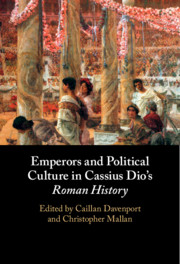Book contents
- Emperors and Political Culture in Cassius Dio’s Roman History
- Emperors and Political Culture in Cassius Dio’s Roman History
- Copyright page
- Contents
- Figures
- Contributors
- Preface
- Abbreviations
- Introduction Cassius Dio
- I Imperial and Political Narratives
- II Emperors and Biographies
- III Political Groups and Political Culture
- IV Reception and Reflection
- Chapter 13 The Reception of Cassius Dio’s Imperial Narrative in Byzantium (Tenth–Twelfth Centuries)
- Epilogue And Now … ?
- Bibliography
- Index
Chapter 13 - The Reception of Cassius Dio’s Imperial Narrative in Byzantium (Tenth–Twelfth Centuries)
from IV - Reception and Reflection
Published online by Cambridge University Press: 23 July 2021
- Emperors and Political Culture in Cassius Dio’s Roman History
- Emperors and Political Culture in Cassius Dio’s Roman History
- Copyright page
- Contents
- Figures
- Contributors
- Preface
- Abbreviations
- Introduction Cassius Dio
- I Imperial and Political Narratives
- II Emperors and Biographies
- III Political Groups and Political Culture
- IV Reception and Reflection
- Chapter 13 The Reception of Cassius Dio’s Imperial Narrative in Byzantium (Tenth–Twelfth Centuries)
- Epilogue And Now … ?
- Bibliography
- Index
Summary
The revived interest in the Roman past in tenth–twelfth century Byzantium led to a revived interest in ancient historical writings, and in particular Cassius Dios’ Roman History, the most comprehensive Greek narrative of the history of Rome. Whereas in earlier periods Dio was mainly referenced by grammarians and moralists, scholars of the tenth through twelfth centuries, who admired Dios’ classicizing prose and identified with his focus on emperors and dynasties, copied, excerpted and abridged his lengthy account. Notably, excerpts from the Roman History were included in the tenth-century Excerpta Constantiniana, a voluminous assemblage of excerpts from historians ranging from the fifth century BC to the ninth century AD commissioned by Constantine VII. An epitome of the Roman History was made by John Xiphilinus, probably for the education of the young Michael VII in the eleventh century, and the text was adapted by John Zonaras in his sophisticated world chronicle in the twelfth century. In addition to these major works, Dio was referenced and utilized by poets such as Theodosios the Deacon, scholars such as John Tzetzes, and educated laymen like Kekaumenos. All this indicates a familiarity with and esteem for Dio’s Roman History not only in court circles but also among the educated reading public.
- Type
- Chapter
- Information
- Emperors and Political Culture in Cassius Dio's Roman History , pp. 289 - 307Publisher: Cambridge University PressPrint publication year: 2021



